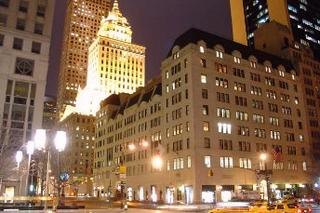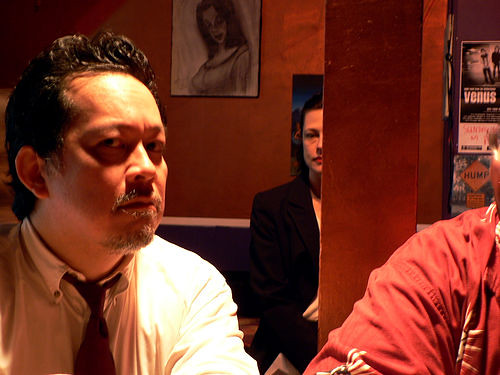 I started out the 90s by leaving my job at the Library of Congress in Washington, my home town, and moving up to New York. To the big time, where I got a job writing for one of those so-called alternative weeklies. I wrote “slice-of-life” stories—stories that usually involved me getting stinking drunk at some bar and getting into arguments and fistfights before finally being kicked out. One might not think so, but it was a formula which lent itself well to about a thousand variations. I never got to do that thousandth variation, though, because after about a year the editors decided that what I was writing about wasn’t cool. Or at any rate, that it wasn’t cool for me to be writing about it.
I started out the 90s by leaving my job at the Library of Congress in Washington, my home town, and moving up to New York. To the big time, where I got a job writing for one of those so-called alternative weeklies. I wrote “slice-of-life” stories—stories that usually involved me getting stinking drunk at some bar and getting into arguments and fistfights before finally being kicked out. One might not think so, but it was a formula which lent itself well to about a thousand variations. I never got to do that thousandth variation, though, because after about a year the editors decided that what I was writing about wasn’t cool. Or at any rate, that it wasn’t cool for me to be writing about it.“That José Bay’s writing is actually coherent, unlike the seemingly usual state of mind of its author,” said one of the many angry letters to the editor in response to my work, “does not justify the waste of space you continue to devote to this self-polluting, sociopathic loser, whiner, and lazy brat.” In closing, the author of this little missive addressed me directly: “Leave New York, José Bay, and go back into the sewer you crawled out of.”
The drinking life—the black eyes, broken noses, and third degree hangovers—that was the realm of Irishmen or Poles or Russians—anyone, as long as they were white. If you were Asian, Hispanic, or black, you had to be a saint, rising up out of poverty, parting ways with the violent gang you used commit crimes with, overcoming your humble immigrant beginnings to live some fucking Horatio Alger American dream.
When you’re not white, and you’re in the public eye, you have to be an example—you have to “represent.” With my byline being “José Bay,” people reading me thought I was Hispanic, though when they saw me in person or saw a picture of me, they knew I was Asian. But whether I was Asian or Hispanic, my unrepentant chronicling of my disorderly behavior wasn’t something I could get away with. Especially since I was Filipino, because Filipinos are supposed to be polite, goddamnit, like everyone’s favorite servant, the Filipino houseboy: Would you like me to fix you another Mai Tai, sir? Or perhaps you’d prefer a Suffering Bastard?
I went on unemployment for a year—that much I could get away with—and, like many a failed journalist before me, started working on a novel. And, like the stereotypical failed journalist, I never finished the novel. So when my unemployment benefits ran out, I started looking for work.
I sent out resumes in response to ads in the New York Times and signed up with an temp agency that specialized in library and research assignments. A few weeks went by and my money was nearly gone. I’d sent out about a hundred resumes and hadn’t been called in for a single interview, but then I got a call from the agency. They had a job for me, a month long temp job that paid fifteen dollars an hour. I added up the numbers and it came to about two grand. Subtract the $675 I paid for rent on my dumpy studio apartment, and take another $100 off for bills, and that left me $1,225. Take off another $200 for food, and that gave me about $1,000 to drink with.
I immediately went over to my friend Randall’s apartment to celebrate. Randall Crump was another white dude—a film maker who’d moved to New York from South Carolina about ten years earlier and who only now had finished shooting his first feature film, a B-movie parody which he called Girlquack. It was an idea he came up with while we were drinking at the Parkside on Houston St.: a movie about these hot babes who communicate with each other by quacking like ducks; living on some remote island in the Pacific, unknown to Western civilization, they come to America in search of their lost queen.
We were completely trashed when the concept appeared before us like the blurry spectacle of a beer bottle falling off the side of the bar, but the next day, when I talked to him about it on the phone, it still made sense. That we were still drunk made no difference: it was a great concept and a great metaphor for our times, even though we had no idea what it meant.
But now it was time to celebrate my escape from the ranks of the unemployable. We started off with a six pack Randall’s girlfriend, Jane, had bought the other night but never got around to drinking. When we were done with that we opened up a fresh bottle of bourbon. Bourbon was our drink of choice—bourbon, the national drink of the S.U.S., the Southern United States, where the most respected science of all is the science of drinking. Like athletes preparing for a heavy workout by doing stretching exercises, beer was our warm up. Whenever it was time for the real workout, we’d twist the cap of a bottle of Jack Daniels, listening for that subtle cracking sound that tells you that the bottle’s contents are ready to be dispensed.
The next day at eight in the morning I hopped on the F Train and took it up to 53rd and Fifth Avenue. I’d only gotten three hours of sleep but I felt good. Taking the elevator up to the 23rd floor of one of the more luxurious high rise office buildings on Fifth Avenue, I reported to a woman named Claudia Schiffer. A tiny, hunched over woman somewhere in her thirties, she didn’t look anything like the supermodel whose name she shared. Nevertheless, I liked her and thought that if I turned on the charm I could get off pretty easy in the month I’d be working with her: two hour lunches, a leisurely pace, and maybe, every now and then, an afternoon quickie in the storage room.
But as soon as she sat down to talk to me about my job she tensed up.
“Well let me just show you to your work station,” she said, turning her face away from me. Standing up, she walked quickly out the door.
I did my nine to five thing there for the first time in over a year, playing with the numbers for what turned out to be some big financial consulting firm. It would take some getting used to, I thought, but I could handle it. Still, as soon as I got off that day I headed across town to the Shandon Star, my midtown dive. I knew that it would take some serious drinking to get through this new job with my senses intact. And in order to stay ahead of the game, I knew I’d have hit the bars immediately at the end of each work day.
Before leaving the Shandon Star I used the phone to check if there were any messages on my answering machine at home. There was one message, from the guy who ran the temp agency.
“This is Donald Miller from Reilly-Bush,” he said. I could tell by the tone of his voice that something was wrong. “Claudia Schiffer called me this evening and asked that you not come back tomorrow.”
Well, I thought, rejected by Claudia Schiffer: it was something that had happened to a lot of other men before me. Then I realized it was not Claudia Schiffer the supermodel who was rejecting me, but Claudia Schiffer the civilian, from the renown financial consulting firm of Baker and Evans.
“And although your work was acceptable,” Miller continued, “the reason Claudia Schiffer asked that you not return was your body odor. It was highly inappropriate.”
My body odor inappropriate? In other words, I was stinking up the joint, most likely with the previous night’s bourbon and that day’s tobacco stench. Christ, I thought, if Claudia Schiffer is environmentally sensitive, what the fuck is she doing in New York City?
“At any rate, we’ll continue to look for other positions for you,” Miller said at the end of his message.
That, I knew, was a lie. His agency wouldn’t do another thing for me—unless, of course, they started filling jobs for sewer workers. I was, apparently, well on my way to crawling back to that sewer from where I came.
Walking out of the Shandon Star and down Eighth Avenue, I kept my distance from people. And although I usually marched straight ahead, making people get out of my way or else be shoved aside, I was now darting left, then right like a lost dog sniffing the sidewalk, searching aimlessly for the territory I’d once staked out as my own. All because my smell wasn’t something I could get away with yet, not even on New York City’s pissed-on streets.
From a novel in progress

No comments:
Post a Comment